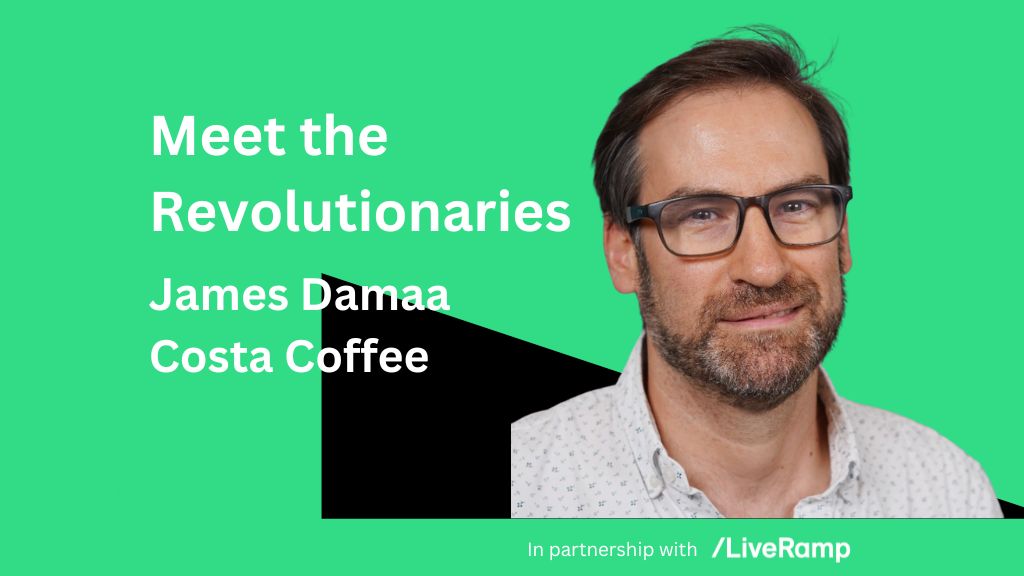New Digital Age (NDA), in association with LiveRamp, is spotlighting the men and women championing a data-led revolution in the marketing industry. ‘Meet the Revolutionaries’ focuses on the efforts of the industry executives helping to push digital marketing into a new era of data collaboration.
Here, James Damaa, Senior Manager – Global Strategic Data Capability at Costa Coffee explains why people skills are as important as technical skills when it comes to driving innovation projects…
Tell me about your current role and how your career to date has led you here.
I’ve been at Costa for three years now. My role involves assessing our data capability against the needs of the business, specifically around targeting and personalisation. I report to our head global consumer data and digital analytic, which is part of our broader marketing function, so it’s essentially a marketing role with a data focus.
I work with lots of different types of stakeholders actually, across the business: marketing, operations, product teams, digital and technology. We work together to create use cases for data in marketing across communications, channels, and different programmes. I also work with data subject matter experts in our data team, people like data scientists, CRM, loyalty, digital analysts. We do that to prove the value of our output, which is our data products.
In addition, I try to look ahead longer term to understand how we can improve our capability through partnerships with suppliers.
Prior to joining Costa, I was agency-side for around 13 years, mostly in data strategy roles, working with some big brands like BT, EE, O2 and British Airways.
Can you give an example of a time when you personally have helped to drive innovation?
Costa is very rich in data. We’re the UK’s favourite coffee brand, we’re over 50 years old and we’ve got one of the largest loyalty schemes in the UK with more than 7 million members. We have lots of ways to market to our consumers through our retail cafes, our coffee vending machines and our branded products in supermarkets. The challenge is to take that rich data, which is often siloed in different systems, to provide a connected and consistent experience for consumers.
We’re currently working on a big digital transformation programme, which should significantly improve our ability to deliver a more joined-up experience and better personalisation.I’ve been in the driving seat for a lot of that project from a data point of view. It’s been challenging but fun and rewarding as well.
There are two major elements to my involvement, both focused around activating our data more effectively.
The first part is around establishing a paid media activation platform that uses our first-party data. The project originated before I joined Costa but hadn’t really gotten very far. When I joined, I was able to accelerate things by collaborating with various internal teams to create a proper business case, approve a tech partner to work with (LiveRamp) and ensure everything was compliant from a consumer privacy point of view. We’ve automated the data that goes into the platform, which has increased our ability to target existing customers and lookalike audiences with more advanced campaigns via social media.
The second project is based around our campaign management and how we manage consumer communications through our CRM team. When I came in, I recommended that we use a new platform and ran the process around vendor selection and getting approval for that from the various stakeholders involved. That’s due to launch shortly and we plan to roll it out globally.
What are the most common challenges or barriers to innovation?
Everyone has lots of good ideas, but you can’t really call them ‘innovative’ until they actually happen. Most innovation projects fail to get off the ground because selling those ideas internally is often a much more difficult skill to master than coming up with the idea itself. If you can’t explain your idea simply and show its value clearly, you’re going to struggle to get the attention and backing of senior decision makers. Being able to put the key numbers against a project, in terms of what it will cost and the value the project can generate, is always a big help in selling your idea.
What tips can you offer others hoping to drive innovation?
Firstly, keep the lines of communication open with other teams. Collaboration is key. Without it, there will be more barriers to success. Also, if you haven’t built a relationship with someone, you don’t know what their needs are, so you won’t know what’s going to appeal to them. Secondly, simplify your ideas, to a basic ‘Problem, Solution, Benefits’ structure. You can then tailor that for different audiences but still keep it simple. Finally, use the data you have to spell out the outcome you are looking for and the level of investment it’s going to take to get you there.
How do you think digital marketing might evolve over the next few years?
It’s hard not to mention generative AI, as there are so many potential use cases. The technology is undoubtedly going to mature and businesses will get much better in how they leverage it.
For me, the most interesting area is the evolution of ‘digital assistants’. There’s a lot of value in trying to use AI to enable people to make better decisions and, potentially, improve their lives.
For example, imagine your digital assistant has a complete view of your usual routine on a day-to-day basis, all with the consumer’s consent. The assistant can then make more meaningful suggestions in the context of the day you are actually living.
So, let’s say it’s a Tuesday morning during school term time. You’re running 30 minutes late as one of the kids had a meltdown at breakfast, then there were roadworks on the way to school that caused a diversion from your normal route. You’ve missed your own breakfast as a result. The digital assistant recognises this and asks, ‘Can I order you a coffee and a pastry for delivery at 9:30am?’
Obviously, that example is very specific to my industry, but you can see how the same sort of technology could apply to things like medical conditions, education and countless other areas that could help people live smarter, happier lives.
Will data collaboration become more important to marketers?
You can now buy just about anything, anywhere, at any time on your phone, whether it’s via an app or a website. As a result, customer data is more complex than ever. There’s more of it and lots of different types. That means marketers are relying on data subject matter experts just to understand their data, let alone use it. They need to lean on those people to transform, explain and extract insight from their data and, in turn, unlock its true value.
The media environment itself is really challenging, but also quite exciting. Look at the evolution of Out of Home advertising, for example. More digital screens; more programmatic buying; more use of data to plan dynamic outdoor campaigns; more interplay with Retail Media. That sort of thing is transforming the playing field for marketers.












